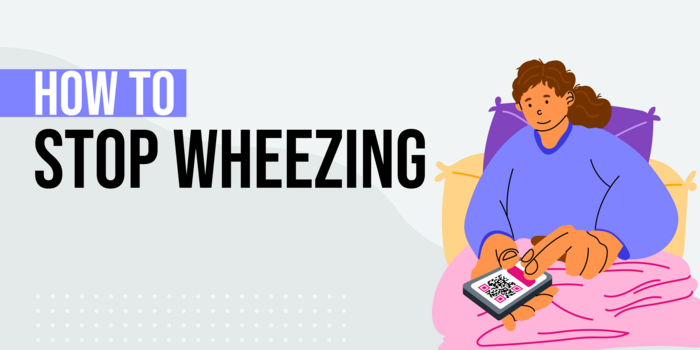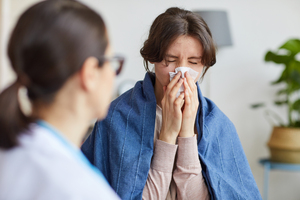Key points
- Wheezing is a high-pitched sound made when breathing, often due to narrowed airways.
- Home remedies for wheezing include drinking warm liquids, using a humidifier, and practicing pursed lip breathing.
- Avoiding environmental triggers such as cold air, allergens, and smoke can help reduce wheezing.
- Wheezing can indicate a serious health condition; seek medical attention if accompanied by symptoms like chest pain or rapid breathing.
- If wheezing is accompanied by severe symptoms like a bluish skin tint, chest pain, rapid breathing, difficulty breathing, headache, or dizziness, immediate medical help is necessary, particularly for young children.

Wheezing is a high-pitched “whistling” sound that occurs when you breathe. Usually wheezing happens when you exhale, but it can also happen when you inhale, according to Very Well Health. They go on to explain that wheezing is caused by a narrowing of the airways in your lungs, which makes it difficult for air to flow freely.
Wheezing is a common symptom of respiratory conditions such as asthma, COPD, bronchitis, pneumonia, and allergies, according to WebMD. People who smoke can also develop wheezing. Wheezing can be a sign of a serious medical condition, or it can be a chronic condition or something someone deals with if they’re exposed to a trigger (in the case of asthma).
Read on for more about what you can do to help relieve wheezing and when you should see a doctor.
Home Remedies for Wheezing
1. Try Drinking Warm Liquids
Drinking warm liquids, such as tea or soup, may help wheezing by breaking up stubborn mucus, according to VeryWellHealth. Additionally, warm liquids can also help keep you hydrated, which can help thin mucus, according to Healthline.
2. Keep the Air Moist With a Humidifier
Using a cool mist humidifier in your home can help to add moisture to the air, which can help to reduce wheezing, according to Healthline. They note that dry air can irritate your airways, which can lead to mucus production and wheezing.
3. Use an Air Purifier
Air purifiers can help to remove allergens and irritants from the air, which can help to reduce wheezing, according to Healthline. They note that you should make sure to choose an air purifier with a HEPA filter—these filters are known to effectively remove particles from the air.
4. Try “Pursed Lip” Breathing
Pursed lip breathing is a breathing technique that involves breathing in slowly through your nose and exhaling slowly through pursed lips. Healthline notes that this breathing technique can help breathe deeper and more effectively. To do this technique, Healthline notes that you should inhale slowly through your nose for two seconds, then pucker your lips (like you’re going to whistle) and slowly exhale for a count of four.
5. Exercise Indoors if you Have Allergies
Exercising indoors can help to reduce wheezing that is caused by cold air or allergens, according to Healthline. This is especially helpful for people who have asthma, or allergies—or who are living in an area with lots of pollution or smoke in the air.
6. Get Adequate Amounts of Vitamins C, D, and E
Vitamins C, D, and E can help to reduce inflammation in your airways and improve your lung function, according to VeryWellHealth. They note that you should make sure to talk to your doctor before adding any vitamins or herbal supplements to your routine—especially if you already take prescription medications.
7. Use Over-the-Counter Antihistamines and Cough Drops
Over-the-counter antihistamines and cough drops can help to reduce wheezing caused by allergies or a cold, according to VeryWellHealth. You can find these items at most retail pharmacies or grocery stores. Be sure to follow the label instructions carefully, to avoid overuse.
8. Avoid Environmental Triggers like Cold Air, Allergens, and Smoke
Cold air, smoke, pollution, and high amounts of pollen in the air may trigger wheezing for some people. Avoiding these triggers can help keep your wheezing symptoms to a minimum. Keeping the windows of your home closed, vacuuming and dusting often, and wearing a mask if you need to be outdoors are a few ways Healthline notes that you can avoid these triggers. Additionally, Healthline notes that you should avoid smoking and exposure to secondhand smoke if you are prone to wheezing.
9. Inhale Steam
Inhaling steam can help to loosen mucus in your airways and reduce wheezing, according to WebMD. They recommend that you sit in the bathroom with a hot shower running and the door closed for a few minutes.
When to See a Doctor
Wheezing can be a sign of a serious health condition, in some cases. Healthline notes that you should see medical attention if you have wheezing along with any of the following symptoms:
- Bluish tint to the skin
- Chest pain
- Rapid breathing
- Feeling like you can’t catch your breath
- Headache
- Dizziness
Additionally, young children should always be checked out by a doctor if they are wheezing, according to Healthline.
Summary of How to Manage Wheezing
Wheezing can be caused by:
- Respiratory viruses
- Pneumonia
- Asthma
- Allergies
- Some medical conditions like COPD and emphysema
There are a few things you can do at home that may help ease wheezing symptoms, including:
- Drinking warm liquids
- Keeping the air moist with a cool-mist humidifier
- Keeping allergens to a minimum with an air purifier
- Avoiding environment triggers
- Exercising indoors if you have allergies
- Antihistamines and cough drops
- Getting adequate amounts of vitamins D, C, and E
- Inhaling steam
- “Pursed lip” breathing exercises
If you are experiencing wheezing with any of the following symptoms, should should be checked out by a doctor right away:
- Bluish tint to the skin
- Chest pain
- Rapid breathing
- Feeling like you can’t catch your breath
- Headache
- Dizziness
FAQs
What is wheezing?
Wheezing is a high-pitched sound made when you breathe, often due to narrowed airways in the lungs.
What are some home remedies to help reduce wheezing?
Drinking warm liquids, using a humidifier, practicing pursed lip breathing, and avoiding environmental triggers can help reduce wheezing.
Can wheezing be a sign of a serious health condition?
Yes, wheezing can indicate a serious health condition, especially if accompanied by symptoms like chest pain, rapid breathing, or a bluish tint to the skin.
When should I seek medical attention for wheezing?
You should seek medical attention if you're experiencing wheezing along with symptoms like chest pain, rapid breathing, feeling like you can't catch your breath, headache, or dizziness.
Can vitamins help reduce wheezing?
Yes, getting adequate amounts of vitamins C, D, and E can help reduce inflammation in your airways and improve lung function.
Are there any over-the-counter medications that can help with wheezing?
Yes, over-the-counter antihistamines and cough drops can help manage wheezing.
Can lifestyle changes help manage wheezing?
Yes, avoiding environmental triggers, exercising indoors, and practicing certain breathing techniques can help manage wheezing.
Can nutritional supplements help with wheezing?
Yes, taking vitamins C, D, and E can help manage wheezing.









